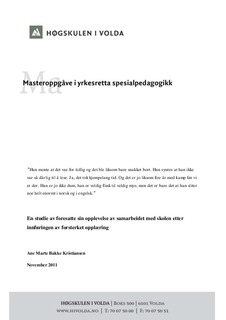En studie av foresatte sin opplevelse av samarbeidet med skolen etter innføringen av forsterket opplæring
Master thesis
Permanent lenke
http://hdl.handle.net/11250/153888Utgivelsesdato
2012Metadata
Vis full innførselSamlinger
Sammendrag
Summary
The topic investigated concerns early childhood intervention and school- home cooperation. Previous research (Nordahl, 2003, 2007; Johnsen, 2008) has shown that parents whose children struggle academically often cooperate poorly when compared to other parents. In autumn of 2009 a decree was added to the Education act § 2-2a. The decree outlined that children in first to fourth grade who are in need of extra academic support should get additional “intensified” tutoring. The intended aim was to decrease the number of children who might need special education1 later in life. In other words, it applies to those children who are not receiving special education pursuant to § 5-1, but whom fall at the low end of the normal distribution in terms of reading and arithmetic scores (Proposition. No. 55, 2008-2009). With a focus on children who struggle with reading, the intent was to uncover the answer to the following question: How do parents with children in need of special support experience cooperation with the school after implementation of intensified tutoring? Qualitative research interviews were conducted in two different primary schools located in a municipality known for its focus on early childhood intervention. A total of eight informants were interviewed, and the central concepts of the interviews concerned cooperation, relationships, power and empowerment. The main trend was that most of the participants reported being relatively satisfied with the cooperation, both prior to and after the intensified tutoring was introduced. The participants reported having a good relationship with the child’s teacher; they felt they were given enough information and they maintained that they would not hesitate to contact the school if necessary. Furthermore, they reported being under the impression that their child’s teacher viewed them as a resource in the effort to improve the child’s reading scores. Nevertheless, the cooperation could also be characterized by information-exchange, coincidences and low levels of parental influence. There are no set guidelines for the conditions of the cooperation; this did however not appear as a problem by the majority. Half of the informants had also been told to "wait and see", in cases where children should have been identified as having difficulties writing and reading. The majority also reported that their child was frustrated and /or were crying while doing homework, and three out of eight relayed that they had felt powerlessness in meeting with school staff. The majority did not know much about the intensified tutoring or how it was organized, however they thought it had a positive impact in terms of their child’s improved reading skills. Sammendrag
Temaet for denne masteroppgaven er forsterket opplæring og skole-hjem-samarbeid. Tidligere forskning (Nordahl, 2003, 2007; Johnsen, 2008) har vist at foreldre som har barn som strever faglig i skolen, ofte har et dårligere samarbeid med skolen enn andre foreldre. Høsten 2009 ble det bestemt gjennom Opplæringslovens § 2-2a, at barn fra første til fjerdetrinn skal få forsterket opplæring. Målet er blant annet å redusere antall barn som får behov for spesialundervisning på et senere tidspunkt i livet. Det gjelder med andre ord for de av barna som ikke får spesialundervisning2 etter § 5-1, men som skårer i nedre sjiktet hva lesing eller regning angår (Ot.prp. nr. 55, 2008-2009). Med bakgrunn i denne satsingen ønsket jeg å finne svar på følgende problemstilling, med fokus på barn med lesevansker: Hvordan opplever foreldre til barn som trenger ekstra tilrettelegging, samarbeidet med skolen etter innføringen av forsterket opplæring? Jeg valgte å benytte meg av kvalitativt forskningsintervju, og intervjuet totalt åtte informanter fra to forskjellige barneskoler i en kommune som har tidlig innsats som satsingsområde. Sentrale temaer i intervjuet er samarbeid, relasjoner, makt og myndiggjøring. Hovedtendensene i empiren er at de fleste foreldre opplever å være relativt fornøyde med samarbeidet med skolen, både før og etter at den forsterkede opplæringen ble innført. De forteller at de har en god relasjon til læreren, at de får nok informasjon, og at de ikke vegrer seg for å ta kontakt med skolen dersom det er noe. Flertallet har i tillegg inntrykk av at læreren ser på dem som en ressurs i arbeidet med barna. Samarbeidet ser dog ut til å preges av informasjonsutveksling, tilfeldigheter og lite reell faglig medvirkning og innflytelse. Det er ikke gitt tydelige føringer for premissene for samarbeidet, men dette oppleves ikke som et problem av flertallet. I tillegg viser det seg at halvparten har fått beskjed om å ”vente og se”, i stedet for å kartlegge barna for lese- og skrivevansker. Flertallet opplever at barna ofte er frustrerte og/eller gråter i arbeidet med leksene, og tre av åtte har opplevd å føle avmakt i møte med skolens ansatte. Flertallet vet ikke så mye om hva forsterket opplæring er, ei hvordan den organiseres, men forteller at de tror den har positiv effekt i form av at barna leser bedre.
